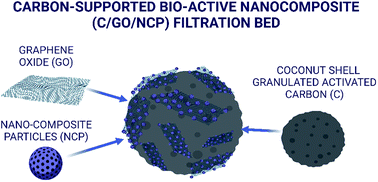Multifunctional carbon-supported bioactive hybrid nanocomposite (C/GO/NCP) bed for superior water decontamination from waterborne microorganisms†
Abstract
Achieving both effective and sustainable water decontamination technology requires development of a universal filtration solution. However, effective removal of natural waterborne microorganisms still remains a challenge. The use of nanoparticles in water filters is promising but also leads to problems with their efficiency and safety. To cross these bottlenecks, we have designed a novel multifunctional carbon-supported bioactive hybrid nanocomposite filtration bed. For this purpose, we took advantage of granular activated carbon (C), graphene oxide (GO) and bioactive Al2O3/Ag nanocomposite particles (NCP). These components were assembled into a hybrid nanocomposite structure using facile in situ surface decoration via a sol–gel approach. This obtained C/GO/NCP filtration bed was thoroughly characterized in terms of morphology, structure and surface properties as well as further evaluated for tap water filtration efficiency. Analysis of the preferential sites for bacteria adsorption and biological tests under close-to-real static and dynamic filtration conditions has proved C/GO/NCP's efficiency in eliminating model and natural strains of waterborne microorganisms. At the same time, nanoparticles were not released into the filtrate, which confirmed material stability and safety. We have also revealed that C/GO/NCP nanofiltration bed was self-sterilizing which means that it entirely eliminated up to 100% of the filtered bacteria cells within short periods of contact time. What is more, the low-temperature thermal regeneration allowed recovering the assumed properties. In general, the obtained results indicate a breakthrough in designing hybrid-structured filtration beds that can be easily synthesized and safely used for drinking water decontamination.



 Please wait while we load your content...
Please wait while we load your content...